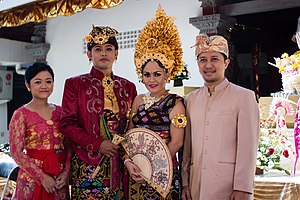Our website is made possible by displaying online advertisements to our visitors.
Please consider supporting us by disabling your ad blocker.
Balinese people
ᬳᬦᬓ᭄ᬩᬮᬶ (Ânak Bali) ᬯᭀᬂᬩᬮᬶ (Wång Bali) ᬓ᭄ᬭᬫᬩᬮᬶ (Krâma Bali) | |
|---|---|
 Balinese couple during their wedding with their friends | |
| Total population | |
| 3,946,416 (2010 census)[1] | |
| Regions with significant populations | |
| 3,946,416[2] | |
| | 3,336,065 |
| | 119,407 |
| | 115,812 |
| | 104,810 |
| | 49,411 |
| | 38,552 |
| | 27,330 |
| Languages | |
| Native: Balinese Dialect: [3] Also: Indonesian Others: English, Dutch (historical)[4] | |
| Religion | |
| Majority Minorities | |
| Related ethnic groups | |
| Bali Aga, Nak Nusé, Javanese, Sundanese, Sasak, Betawi and other Austronesian peoples | |
The Balinese people (Indonesian: Suku Bali; Balinese: ᬳᬦᬓ᭄ᬩᬮᬶ, romanized: Ânak Bali) are an Austronesian ethnic group native to the Indonesian island of Bali. The Balinese population of 4.2 million (1.7% of Indonesia's population) live mostly on the island of Bali, making up 89% of the island's population.[6] There are also significant populations on the island of Lombok and in the easternmost regions of Java (e.g. the regency of Banyuwangi). The Balinese are distinctive amongst Indonesian ethnic groups for their adherence to Balinese Hinduism rather than Sunni Islam.
- ^ Na'im, Akhsan; Syaputra, Hendry (2010). "Nationality, Ethnicity, Religion, and Languages of Indonesians" (PDF) (in Indonesian). Statistics Indonesia (BPS). Archived (PDF) from the original on 23 September 2015. Retrieved 23 September 2015.
- ^ Akhsan Na'im, Hendry Syaputra (2011). Kewarganegaraan, Suku Bangsa, Agama dan Bahasa Sehari-hari Penduduk Indonesia Hasil Sensus Penduduk 2010. Badan Pusat Statistik. ISBN 978-979-064-417-5.
- ^ Cite error: The named reference
:0was invoked but never defined (see the help page). - ^ "History of Bali during the Dutch Colonial Period". 28 December 2019.
- ^ Aris Ananta; Evi Nurvidya Arifin; M Sairi Hasbullah; Nur Budi Handayani; Agus Pramono (2015). Demography of Indonesia's Ethnicity. Singapore: Institute of Southeast Asian Studies. p. 273.
- ^ Ni Komang Erviani (17 December 2012). "Bali Faces Population Boom, Now Home to 4.2 Million Residents". The Jakarta Post. Retrieved 2022-12-05.
Previous Page Next Page


